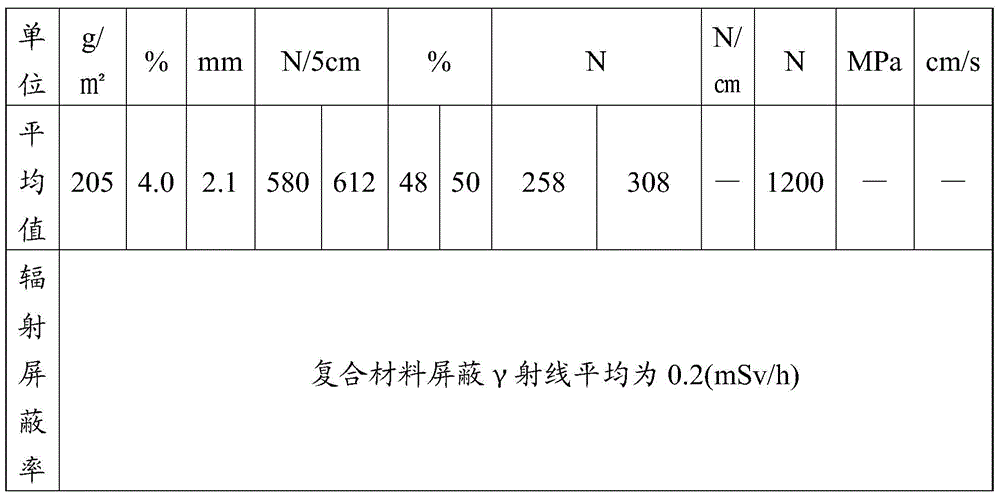Anti-nuclear radiation composite flexible material, preparation method thereof, and geomembrane containing anti-nuclear radiation composite flexible material
A technology of anti-nuclear radiation and flexible materials, applied in the field of anti-nuclear radiation, can solve the problems of difficult construction and heavy weight, and achieve the effects of good shielding and radiation effects, light weight and low cost
- Summary
- Abstract
- Description
- Claims
- Application Information
AI Technical Summary
Problems solved by technology
Method used
Image
Examples
preparation example Construction
[0061] The present invention also provides a preparation method of a nuclear radiation-proof composite flexible material, comprising:
[0062] The non-woven fabric is subjected to thermal cross-linking treatment after being immersed in an emulsion including acrylic resin, PE resin, cross-linking agent and water; the non-woven fabric is made of polymer fibers and stainless steel fibers;
[0063] Drying and cold-rolling the non-woven fabric obtained by thermal cross-linking treatment to obtain a nuclear radiation-proof composite flexible material.
[0064] The present invention uses non-woven fabric as the main body material of anti-nuclear radiation composite flexible material, and described non-woven fabric is preferably prepared according to the following method:
[0065] After mixing stainless steel fibers and polymer fibers, they are opened and carded to obtain nascent fiber webs;
[0066] The nascent fiber web is tiled by a cross-lapper to obtain a fluffy fiber web;
[0...
Embodiment 1
[0101] Mix stainless steel fibers with a fineness of 3.0-6.0dtex and a length of 56-65mm and polypropylene fibers with a fineness of 3.0-6.0dtex, a length of 56-65mm and a strength of 70CN / dtex at a ratio of 0.1:1. The fiber after mixing forms nascent fiber web after opening and carding; Said nascent fiber web is flat-laid into 200g / m through poor web-laying machine 2 The fluffy fiber web; the fluffy fiber web is consolidated and compounded by needle punching up and down, and the needle punching density is 300 punches / cm 2 , to obtain a nonwoven fabric with a thickness of 2mm;
[0102] The non-woven fabric is immersed in the emulsion comprising 5.0wt% acrylic resin, 5.0wt% PE resin, 1.0wt% SAden163 crosslinking agent and 89wt% water, so that the amount of sizing is 5.0wt%; The non-woven fabric impregnated with the emulsion is cross-linked and compounded at a temperature of 110±2°C, then dried at a temperature of 130±2°C, and then entered into a cold rolling mill at a temperat...
Embodiment 2
[0108] Mix stainless steel fibers with a fineness of 3.0-6.0dtex and a length of 56-65mm and polypropylene fibers with a fineness of 3.0-6.0dtex, a length of 56-65mm and a strength of 70CN / dtex at a ratio of 0.1:1. The fiber after mixing forms nascent fiber web after opening and carding; Said nascent fiber web is flattened into 500g / m 2 The fluffy fiber web; the fluffy fiber web is consolidated and compounded by needle punching up and down, and the needle punching density is 300 punches / cm 2 , to obtain a nonwoven fabric with a thickness of 4mm;
[0109] The non-woven fabric is immersed in the emulsion comprising 5.0wt% acrylic resin, 5.0wt% PE resin, 1.0wt% SAden163 crosslinking agent and 89wt% water, so that the amount of sizing is 5.0wt%; The non-woven fabric impregnated with the emulsion is cross-linked and compounded at a temperature of 110±2°C, then dried at a temperature of 130±2°C, and then entered into a cold rolling mill at a temperature of 10±0.5°C to be rapidly co...
PUM
| Property | Measurement | Unit |
|---|---|---|
| length | aaaaa | aaaaa |
| thickness | aaaaa | aaaaa |
| particle size | aaaaa | aaaaa |
Abstract
Description
Claims
Application Information
 Login to View More
Login to View More - R&D
- Intellectual Property
- Life Sciences
- Materials
- Tech Scout
- Unparalleled Data Quality
- Higher Quality Content
- 60% Fewer Hallucinations
Browse by: Latest US Patents, China's latest patents, Technical Efficacy Thesaurus, Application Domain, Technology Topic, Popular Technical Reports.
© 2025 PatSnap. All rights reserved.Legal|Privacy policy|Modern Slavery Act Transparency Statement|Sitemap|About US| Contact US: help@patsnap.com



